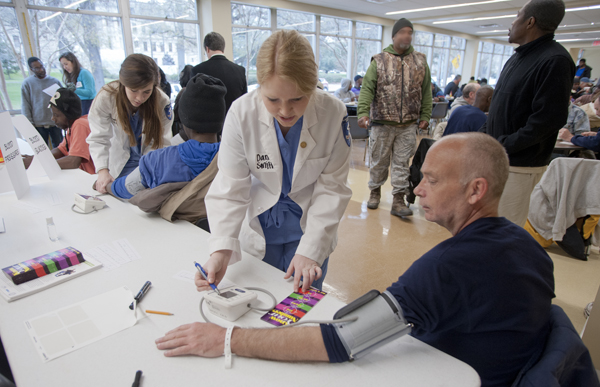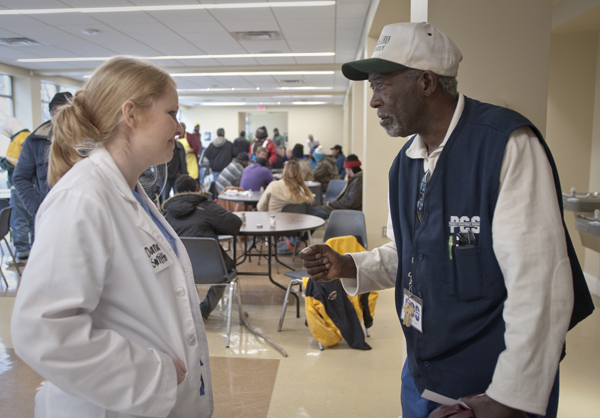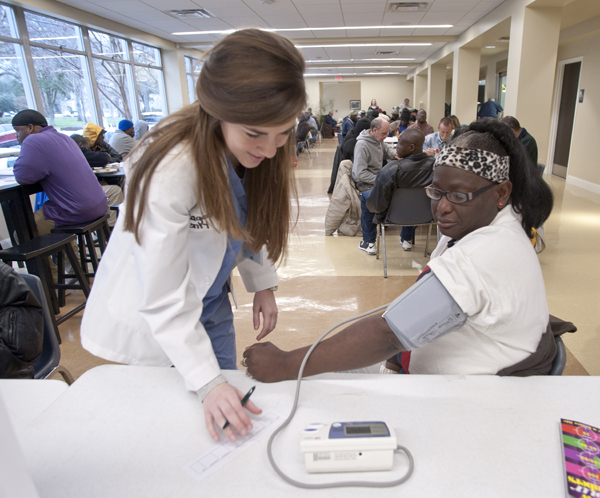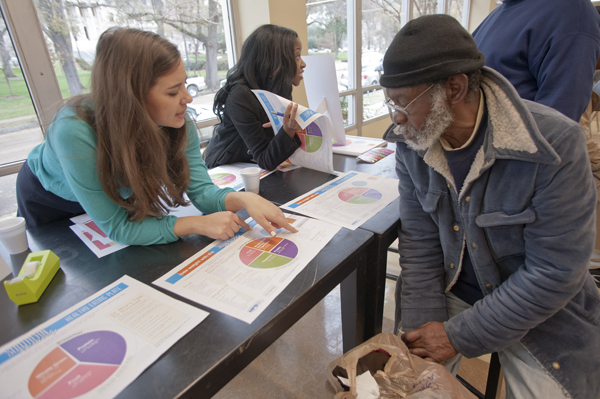Community screening program spreads gospel of healthy habits

Published in News Stories on January 29, 2015
As usual, dozens of men and women were lining up at Galloway United Methodist Church’s soup kitchen last Thursday morning, but most were hungry for more than food.
About an hour later, many in this mostly homeless group had filled up on a serving of red beans and rice, as well as a plateful of free information about the state of their health.
“I’ve got high blood pressure, and it’s a struggle to go to the doctor, to get the money to go,” said Noel Anderson Rhodes, a volunteer at Grace Place, Galloway’s morning shelter.
“So this is good for the people who come to Grace Place. There’s usually nobody looking out for them. They usually have to look out for themselves.”
Watching out for them on this particular day were a group of first-year medical students and other Medical Center participants in UMMC’s Community Health Advocate (CHA) program, a plan to spread the gospel of healthy habits across the state – particularly to people with low incomes.
At Galloway, stations were set up near the Grace Place dining area, where students took blood-pressure and Body Mass Index readings and measured blood-glucose levels for about 60 of the Grace Place guests.

Dana Smith assures Grace Place regular Leon Buggs about his blood pressure.
“They told me my blood pressure is alright; I don’t have to worry about it,” said Leon Buggs, 65, a Grace Place regular. “And I didn’t have to come to them. They’re waiting on me. It’s a wonderful thing.”
The Grace Place men and women also received lessons in healthy eating and weight control from Rosemary Moak, the new coordinator of CHA, and Kara Avery, a volunteer with the anti-poverty AmeriCorps VISTA program.
This was the first of two consecutive-day screenings at Grace Place, where four M1s took on the first one: Kaitlyn Renfrow, Natalie Ethridge, Dana Smith and Megan Henry, who called it a “cool experience.
“One man told me he eats nothing but ramen noodles,” Henry said. “His blood pressure was high. A lot of the people we talk to are concerned with their blood pressure. They need to change their diet to get it down.
“This all reminds you why you’re in school.”
More screenings are planned at the church, said Leslie Bingham, director of Missions and Outreach at Galloway. Similar health checks are on tap at participating churches and civic organizations in the Jackson area and beyond.

Megan Henry checks the blood pressure of Grace Place visitor Tonya Austin Williams.
They will be conducted by first-year medical students, who have been certified as health screeners, or by the men and women these students will train as screeners for churches and civic organizations so they can stage their own health checks and promote healthy choices in their communities.
“So far, we had been focused on the hard sciences, which means you can get far removed from the patient population,” said Nicholas Boullard, an M1.
“This program pulls you back to the roots of primary care.”
Support for training, certification and recertification comes through UMMC’s Office of Healthy Linkages, whose director is Michael L. Jones. Other partners in the program include the Myrlie Evers-Williams Institute for the Elimination of Health Disparities and Mississippi Public Broadcasting’s Southern Remedy Radio and Television Health Productions.
“The goal is to train every student at UMMC,” said Dr. Rick deShazo, professor of medicine and pediatrics, and a host of “Southern Remedy,” MPB’s live, patient-interactive radio talk program. DeShazo chairs the CHA program’s steering committee, which includes Dr. Deborah Minor, pharmacist and professor of medicine; Dr. Alan Penman, professor of medicine; Dr. Josie Bidwell, assistant professor of nursing; Penny Rogers, assistant professor of occupational therapy; and Rebecca Turner, registered dietitian.

Rosemary Moak, left, and Kara Avery, center, dole out healthy-eating information to Grace Place visitors, including, Charles King, right.
As part of the CHA initiative, the Southern Remedy Healthy Living Program offers guidance on walking and flexibility, as well as a nutrition guide dubbed Choose My Plate. Healthy living guides and more are available on the Southern Remedy website, www.mpbonline.org/southernremedy.
One of CHA’s most valuable contributions is offering information to those who don’t know where or how to find it, said health literacy enthusiast Dr. Deborah Minor, who hosts Southern Remedy’s “Healthy and Fit” series on MPB Radio.
“Perhaps the greatest thing we can do is connect people with resources. This is a unique population that is often overlooked. Many are 65 or older and have health insurance, but don’t know what to do with it.”
Her point hit home as she counseled a man who didn’t know insurance will often help pay for the cost of glucose test strips.
“The difference you make is helping people explore and understand how to get help,” Minor said afterward. “It’s listening and showing you care.”

To volunteer to be trained as a community health advocate, schedule a screening event, or for more information, contact Kara Avery at kavery2@umc.edu or Rosemary Moak at rmoak@umc.edu. To schedule a training event, contact Michael Jones at mljones2@umc.edu, Dr. Richard deShazo at rdeshazo@umc.edu or Dr. Deborah Minor at dminor@umc.edu.


